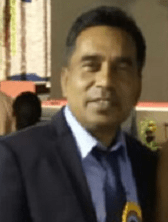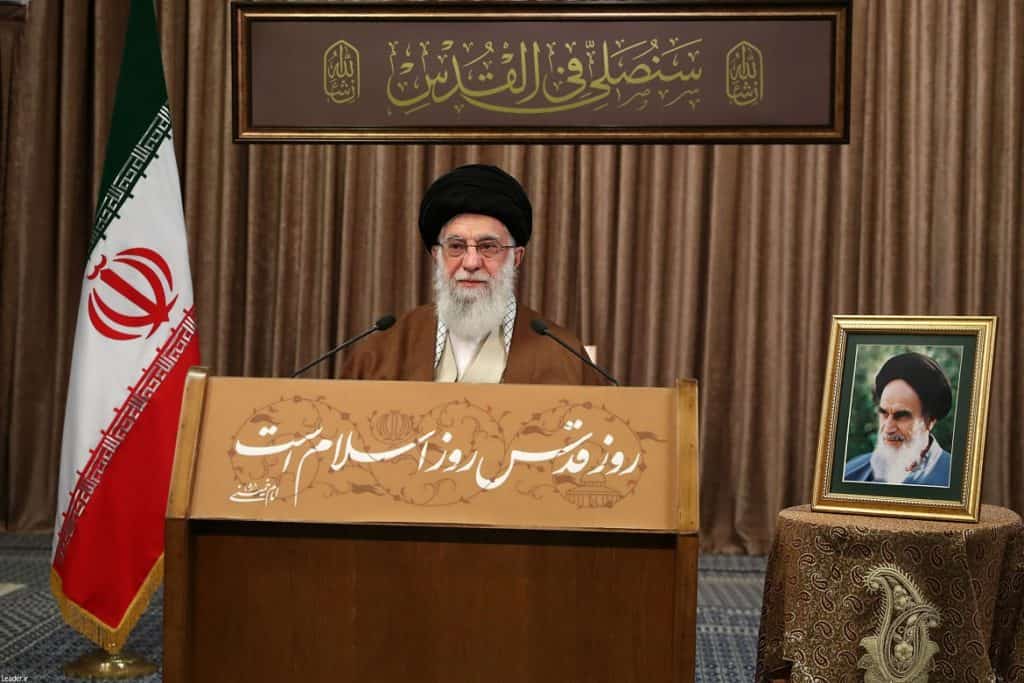By Dr Khushnam P N
The ‘Quds Day’ celebration in Iran on Friday 22nd May, 2020, has raised the temperature of Iran and Israel state of belligerency.

The Quds stands for ‘Jerusalem’ in Arabic and the ‘Quds Day’ is celebrated every year on the last Friday of Ramadan, since the Iranian Revolution in 1979, to express support for the Palestinians and oppose Zionism and Israel. The whole idea is based on the ‘liberation of Palestine’ as an Islamic question promoting Iran’s revolutionary credential as voice of Muslims around the world.
The ‘Coordinating Council for Islamic Propaganda’ of Iran, led by the Interior Ministry and the Islamic Revolutionary Guard Corps (IRGC), has manage this “unstoppable event” under the pandemic this year. Last year ‘Quds Day’ was directed against the “Middle East Peace Plan” of the US, which they claimed would fail. Given the momentum of the West Bank annexation Plan of the new government of national unity of Israel, Iran has focused the celebration of the day as a “religious and human duty of freedom fighters around the world”.
Political hostility between Iran and Israel, amid the endless flow of violence and the scourge of the pandemic, can take a virulent course and proportion, if this absurd bellicosity remains unattended and not addressed by regional powers and actors with responsibility.
In his important Quds Day speech on May 22, 2020, the Iranian supreme leader added a new spark to the growing tension, whipping western powers and Arab allies into the region, nicknaming them “puppets” for their support for Israel, and declaring that it is an “Islamic duty” to fight for the “liberation” of Palestine.
The official website of the Leader mentioned that Americans “will not be staying in Iraq or Syria, they must withdraw and they will certainly be expelled”. While addressing the students through video conference, the Leader added that “Even leaders of some of America’s allies abhor American statesman and government, do not trust them and they are indifferent towards them”. These words have deeper implications in the wake of impending the Israel’s West Bank annexation.
This century old vexing emotive issue of Palestine needs the utmost care and consideration to assure peace and security in this violence-torn fragile region.
On 22nd May, 2020, President Netanyahu replied to an old speech posted on Tweeter by the Iranian Supreme leader that “eliminating the Zionist regime does not mean eliminating Jews”, Netanyahu also said that “He should know that any regime that threatens the extermination of Israel will find itself in similar danger”.
The ensuing cyber-attacks on each other have added a new dangerous dimension to the hostiles. To the Iranian Cyber-attacks on Israeli business sites and municipalities, with the provoking message “the countdown to the destruction of Israel began long ago”, Israel responded with a cyber-attack on the strategic Strait of Hormouz port, Shahid Rajaee.
The Iranian leader has also spoken out in many other ways against Israel and its policies. The following statements and tweets are worth analyzing to understand the dangerous war of words, and their implications for the security of the region. “We will support and assist any nation or any group anywhere who opposes and fights the Zionist regime and we do not hesitate to say this”, that may represent an open and dangerous declaration of support to all state and non-state actors, “the elimination of the government of Israel does not mean the elimination of Jews. We don’t have an issue with Jewish people”, “Elimination of Israel means that Muslim, Christian and Jewish people of Palestine choose their own government and push out foreigners and thugs like [Israeli Prime Minister Benjamin] Netanyahu”. These words of bellicosity, in the wake of imminent West Bank annexation, may push the region to new alignment and violence beyond the reach of contemporary peace mechanism.
In the midst of this growing tension, Mahmoud Abbas, president of the Palestinian National Authority, announced on May 19, 2020 that “The Palestinian liberation organization and the state of Palestine are free, to date, of all agreements and understandings, with the Americans and Israeli governments and by all obligations based on such understandings and agreements, including those on security. ”
The situation that is going to evolve in the coming days is wrought with numerous serious repercussions. It can be imagined by the additional remark of Mr Mahmoud Abbas that, now only Israel have to “shoulder all responsibilities and obligations in front of the international community as an occupying power over the territory of the state of Palestine”, and the United States, as a “primary partner with the Israeli occupation government” will be “fully responsible for the oppression of the Palestinian people”. The emerging situation is turning hotter every passing day with the escalation of statements of Iran and Israel against each other.
Mr Nicholay Mladenov, UN Special Coordinator for the Middle East Peace Process, told the UN Security Council, that annexation would represent “a most serious violation of international law” and such a move devastate the prospect of the ‘Two-State’ solution. He also urged the Middle East Quartet- the United States, Russian Federation, European Union and the United Nations to intervene immediately with a mediation plan in view of maintaining peace in the region. He added that “the Fate of the Palestinian and Israeli people must not be determined by destructive unilateral action that cements division and may put peace beyond reach in our lifetime”.
Taking in account the reaction of the European Union’s foreign policy chief, Josep Borrell, the EU probably will go beyond the mere condemnation and will take punitive action against Israel, if it goes ahead with the plan. So it seems that the international public opinion is against the Israeli strategy.
One of the foundation principle and objective of the Organization of Islamic Cooperation (OIC), as stated in its Charter, is “To support and empower the Palestinian people to exercise their right to self-determination and establish their sovereign State with Al-Quds Al-Sharif as its capital, while safeguarding its historic and Islamic character as well as the Holy places therein”. The Secretary General of the OIC, Dr Yousef Al-Othaimeen had a telephonic conversation with the Foreign Minister of the State of Palestine, Dr Riyad al-Maliki regarding Israel’s West Bank annexation Plan and the necessary response to it. They have also decided to hold an extraordinary meeting of the OIC Executive Committee soon.
Despite the rising strategic closeness of Israel with the Arab Gulf States, they cannot afford to maintain a strategic silence in the face of the emotional content of the Palestine question. Even the Saudi leaders have raised the question of annexation in public and the Saudi king, Salman bin Abdulaziz Al Saud, in the Saudi press, said the kingdom “remains steadfast on the side of the Palestinian people.” Jordan’s King Abdullah II referring the annexation plan warned that Israel was on course for a “massive conflict”.
The Arab League after its virtual conference chaired by Cairo, condemned the move by saying that it would constitute a “new war crime” against the Palestinians.
The region over a century has turned into a complex regional conflict zone and is on the verge of lapsing into a violent quagmire. The annexation plan can tear the region forever and thus needs course correction by weaving together peace gains. With the pandemic underway, Israel must weigh its options for security in a long term basis and Iran must respond with responsibility, for the greater cause of regional peace and security. The powers must intervene with a pragmatic plan, based on rule-based International process, and spirit of multilateralism followed so far to resolve the Palestine issue on the base of the ‘Two-State’ solution.
Author: Dr Khushnam P N Independent IR and Regional Security Researcher and Analyst (Theories of IR & Regional Security, Politics and Security in West Asia, Indian Foreign Policy, Iran-Israel & US, Indo-Pacific, Geopolitics and Multilateralism). Specialization: Iran, US & Gulf Security. Bangalore, India
(The opinions expressed in this article are solely those of the author and do not necessarily reflect the views of World Geostrategic Insights)







